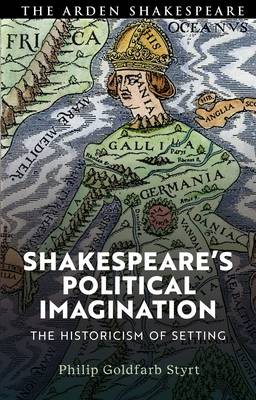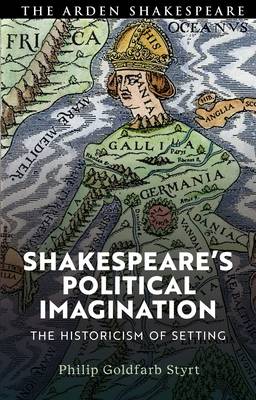
Bedankt voor het vertrouwen het afgelopen jaar! Om jou te bedanken bieden we GRATIS verzending (in België) aan op alles gedurende de hele maand januari.
- Afhalen na 1 uur in een winkel met voorraad
- In januari gratis thuislevering in België
- Ruim aanbod met 7 miljoen producten
Bedankt voor het vertrouwen het afgelopen jaar! Om jou te bedanken bieden we GRATIS verzending (in België) aan op alles gedurende de hele maand januari.
- Afhalen na 1 uur in een winkel met voorraad
- In januari gratis thuislevering in België
- Ruim aanbod met 7 miljoen producten
Zoeken
Shakespeare's Political Imagination
The Historicism of Setting
Philip Goldfarb Styrt
Paperback | Engels
€ 67,95
+ 135 punten
Omschrijving
Shakespeare's Political Imaginationargues that to better understand Shakespeare's plays it is essential to look at the historicism of setting: how the places and societies depicted in the plays were understood in the period when they were written. This book offers us new readings of neglected critical moments in key plays, such as Malcolm's final speech in Macbethand the Duke's inaction in The Merchant of Venice, by investigating early modern views about each setting and demonstrating how the plays navigate between those contemporary perspectives. Divided into three parts, this book explores Shakespeare's historicist use of medieval Britain and Scotland in King Johnand Macbeth;ancient Rome in Julius Caesarand Coriolanus; and Renaissance Europe through Venice and Vienna in The Merchant of Venice, Othelloand Measure for Measure.
Philip Goldfarb Styrt argues that settings are a powerful component in Shakespeare's worlds that not only function as physical locations, but are a mechanism through which he communicates the political and social orders of the plays. Reading the plays in light of these social and political contexts reveals Shakespeare's dramatic method: how he used competing cultural narratives about other cultures to situate the action of his plays. These fresh insights encourage us to move away from overly localized or universalized readings of the plays and re-discover hidden moments and meanings that have long been obscured.
Philip Goldfarb Styrt argues that settings are a powerful component in Shakespeare's worlds that not only function as physical locations, but are a mechanism through which he communicates the political and social orders of the plays. Reading the plays in light of these social and political contexts reveals Shakespeare's dramatic method: how he used competing cultural narratives about other cultures to situate the action of his plays. These fresh insights encourage us to move away from overly localized or universalized readings of the plays and re-discover hidden moments and meanings that have long been obscured.
Specificaties
Betrokkenen
- Auteur(s):
- Uitgeverij:
Inhoud
- Aantal bladzijden:
- 232
- Taal:
- Engels
Eigenschappen
- Productcode (EAN):
- 9781350277878
- Verschijningsdatum:
- 29/06/2023
- Uitvoering:
- Paperback
- Formaat:
- Trade paperback (VS)
- Afmetingen:
- 140 mm x 216 mm
- Gewicht:
- 272 g

Alleen bij Standaard Boekhandel
+ 135 punten op je klantenkaart van Standaard Boekhandel
Beoordelingen
We publiceren alleen reviews die voldoen aan de voorwaarden voor reviews. Bekijk onze voorwaarden voor reviews.









